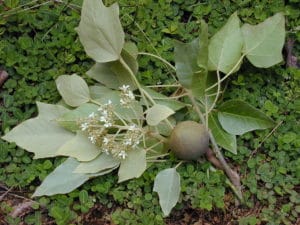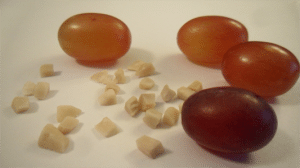
Of course! The Indian Walnut, also known as Nuez de la India Aluerites Moluccana, Candlenut, Kukui, is a powerful nut native to the Indo-Malaysia region and was introduced throughout the Pacific Islands in ancient times.
The traditional uses of the Indian Walnut are extensive. Almost all parts of the tree, including the leaves, fruits, bark, wood, roots, sap and flowers, are useful for traditional medicine, lighting, building materials, dyes, food, decorations and many other uses. In Japan, the bark has been used on tumors. In Sumatra, pounded seeds, burnt with charcoal, are applied around the navel for costiveness. In Malaysia, the pulped kernels or boiled leaves are used in poultices for headache, fevers, ulcers, swollen joints and gonorrhoea. In Hawaii, the flowers and the sap at the top of the husk (when just removed from the branch) have been used to treat candidiasis in children. The nut is often used for cooking in Indonesian and Malaysian cuisine. In Java, it is also used to make a thick sauce that is eaten with vegetables and rice.
Oil extracted from the seed is an irritant and laxative, and sometimes used like castor oil. It can be made into soap. Chewed seeds are used as a soap substitute. It is also useful for conditioning the hair.
We know it'll work because throughout the years, we've had thousands of satisfied customers using The Indian Walnut.
Heres more information directly from the USDA
Additional Information I
Additional Information II
Additional Information III




 (Size comparison with a grape)
(Size comparison with a grape)
 One of the key advantages The Indian Walnut offers is, it starts working while you sleep, hence taking it at night before bed with a glass of water.
One of the key advantages The Indian Walnut offers is, it starts working while you sleep, hence taking it at night before bed with a glass of water.

 Orders typically arrive between 2 to 5 business days.
Orders typically arrive between 2 to 5 business days.